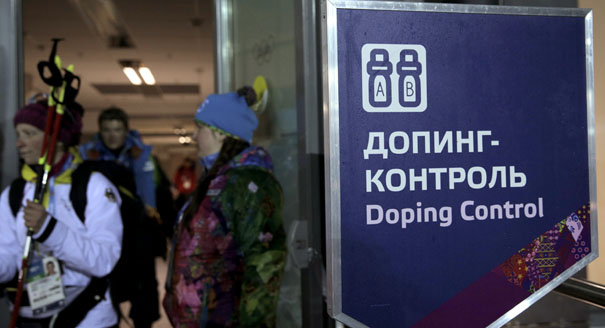Performance-enhancing drugs help athletes win, and in Russia, every victory is a matter of national importance. After all, sports are a form of soft power, another battlefield in the war with the West. Athletes are soldiers, and sports are a continuation of war by other means, a function of Russia’s domestic and foreign policies.
In such an environment, Russia’s athlete-soldiers are considered unpatriotic if they don’t follow orders from their commanding officers—who, as we learned recently, work for the Federal Security Service and the Ministry of Sports.
We’re seeing something completely new in Russian sports these days—unlike even the politics of sports in the USSR. Nevertheless, we’ve gotten a whiff of the KGB’s old tactics recently: to avoid testing positive for performance-enhancing drugs, Russian athletes are said to have exchanged tainted urine samples for clean ones through a hole in a wall of the anti-doping laboratory at the 2014 Sochi Olympics. Although it sounds like a scene from a bad spy movie, it is in fact the inside of a system that has pitted itself against the entire world.
It appeared Russia’s reputation was beyond repair after the Bolotnaya Square arrests, MH17, the debacle in eastern Ukraine, the Panama Papers, and the latest package of draconian legislation. But then came the McLaren report, which revealed the scale of state involvement in the doping ring and dealt a serious foreign policy defeat to the regime.
This defeat is particularly painful because it will be difficult for the government to explain away. Of course, some have dismissed it as another conspiracy against Russia, an attempt to deprive the world of Russian sports glory.
But this is a weak defense. It’s not obvious why the international sports world would conspire against Russia. After all, it was the Federal Security Service—not Obama or Stoltenberg—who drugged our athletes.
And it’s not as though Russian athletics have excelled recently, even with the aid of performance-enhancing drugs; a number of sports are struggling despite heavy government investment. Is Uncle Sam poisoning our soccer, basketball, volleyball, and handball players?
Because no one can be held responsible, ordinary Russians are already paying for the country’s Olympic failures: they are being swamped with another barrage of anti-Western propaganda.
The problem is that our athletes are always expected to live up to goals established by the state. Their victories are equated to the Red Army’s victory at Stalingrad. To achieve success, they’re treated like guinea pigs in lab experiments run by the security services.
Paradoxically, it’s likely that Russian sports would actually improve without the state doping program. But it won’t happen right away. And Russian athletics certainly won’t improve if the state continues to care more about glory for the country and the president than about the sports themselves. Nothing happens fast in today’s high-performance sports world; cultivating a world-class athlete takes years of patience and training. And we can’t afford to isolate ourselves from the rest of the world: modern sports are just as internationalized as science.
Sports mirror politics when they become matters of national importance. Like the regime, Russian sports are now mired in fraud, deception, hysterical patriotism, and oversensitivity. Refusing to look inward, Russia must find external justifications for its failures.
When International Olympic Committee President Thomas Bach said that the IOC was about to make difficult choices “between collective and individual responsibility,” Putin’s Press Secretary Dmitry Peskov responded that only the athletes who took performance-enhancing drugs should be held accountable.
In other words, the Kremlin is pretending that it cares more about individual responsibility than the system itself. But Bach is right: the system, which elevates results above sportsmanship, is to blame.
Though sports mirror politics, simply singing patriotic songs won’t help Russian athletes break records. A Soviet-era song asks goalkeepers to conceive of their goal line as the national border; all isolationist hysteria aside, no Russian goalie believes this anymore.



